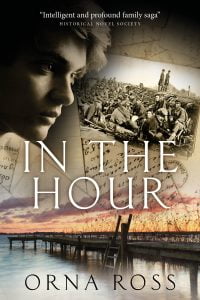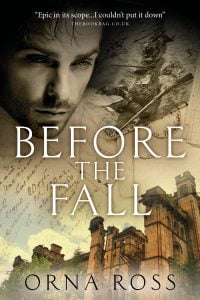Below is the opening of “In The Hour”, my next novel. It is the third book in my Irish Trilogy. For more details on the first two books, After The Rising and Before the Fall, see below.
If you ever visit Wexford town and travel along the quays from the south end–where the Talbot Hotel is now–towards the north railway station, the sight of the sea emerging on your right-hand side will surely charm you.
That wide expanse of water where the Irish sea and Slaney river meet in Wexford Harbor has been rightly renowned, across ten centuries, and still has much to attract the eye. You'll see the bridge, the longest in Ireland, and across the mudflats or the sea–depending on the height of the tideline–you'll see the stranded remains of Begerin island.
This islet of glacial drift, protruding above the waves of muddy sand or water, is where St Ibar established his monastery, long before St Patrick, the people of Wexford will tell you with a mix of pride and a sense of being cheated out of national saint status. And you might, as I do, feel Begerin (beag Eirinn, little Ireland) holds in the air around it still something of the magic and mystery of that time.
Along the dockside, you'll see the pleasure crafts and fishing trawlers lined up, and signs everywhere signs of old maritime ways: coils of rope, and stacks of nets, and stained brown sails, and mooring posts and bollards. Young women pass, wheeling children, and old men sit, staring out beyond the estuarine water at ships that sailed into the distance, long ago.
And looking out that way with them, most likely with the sun in your eyes, for the bay faces due east, you’ll fail to notice on the landward side, rows of little alley streets leading down on to the quays. These passageways were the creation of Vikings, from the land we now call Denmark, who invaded Wexford more than a millennium ago, and they've hardly changed their shape since they went in, except to get more solid, brick and concrete replacing wood, and to put in modern shops and eating houses.
They seem a long way from the water, these little streets, and most of the time they are. Most of the time, sea and river are contained by the quays but every once in a while, they rear up and remind the people of Wexford that we relax in our lives, only on nature's mercy.
Such a surge happened on a Saturday night in 1975, when a storm, and a full moon, and a swollen October tide made the Horse River that runs underneath those little alleyway houses rise and rise until the drains burst, and Wexford became a little Venice. And, as there so often is in that watery city of mists and shadows, there was a mysterious drowning.
*
We saw the storm's beginnings in Mucknamore. At about four o'clock, the wind whipped up and the sea got choppy, but we never thought for a moment, my father or I, that it should keep us home. It was the highlight of the week for us both, our trip to town, where he'd go boozing with his friends, and I'd go to “drink coffee” with mine.
By the time we were leaving, the rain was tipping down, and it took us nearly twice as long to drive in as usual, with Daddy sitting over the steering-wheel, nose to the windscreen, and the wind rocking the car in gusts. We didn't get out at Brady's little pub on The Faythe, where he hung out with his cronies, as we usually did, leaving me to walk the rest of the way to Main St. He drove on, to drop me down.
As we came to the quays, great waves were riding down the estuary, tossing boats around like shells. “Jesus!” he said. “Maybe we should go home.”
Then he looked at me, laughing at my disappointed face. “Alright, but you're to be careful. No gallivanting tonight.”
Gallivanting was his word for whatever he suspected I did on these nights out, and for whatever he got up to on his. Secrets we'd never tell each other, but that still were shared in the permission to enjoy ourselves, and in the keeping of it away from Mrs D.
He pulled to a stop outside the Main St entrance to White's Hotel. I pulled my hood up, against the blast of wind and rain that hit the side of my head as I got out, but also to hide. In those years to be seen with a parent was the ultimate in sad shame.
That was the last thought I gave him.
“See ya” were my last words.
My friends and I had a good night, and when it was time for us to go home, four of us left together. I was with Jewel Rossiter, my best friend Dee had chosen his friend Domo as her squeeze of the night. We did a little kissing in two adjacent doorways, squeezing ourselves into the shadows, out of the wind and the rain, while we waited for my father to drive up, in the usual way, and park at the corner.
He was late, but that wasn't surprising with the weather. I was always happy when he was late, it meant extra time with my friends. There was water flowing down North Main Street but nothing impassable. I knew nothing, yet, about what water does to a car if it gets into an engine, if it rises up to the level of the doors.
Afterward, people puzzled about why he'd turned into King St, when it was so clearly dangerous.
By then, apparently, the water was moving like a frightened, living creature down Distillery Road, where the river had burst its banks, as well as up from the high tide washing over the quays.
By the time I was running to the phone box, head down, my hair plastered to my forehead through my hood, he was already dead.
Jewel squeezed into beside me and as my mother answered the phone–“Hello? Siobhan? Is that you?” he was making faces of high panic, trying to make me laugh.
“Where are you? The sea is like a wild thing. You can't see an inch in front of your nose out there.”
“Daddy hasn't arrived.”
“Oh that man,” she said. “And you.”
The first mention of my most great and grievous fault. “Me?”
“Going out on a night like this. Home never good enough for either of you.”
“We weren't to know.”
“Ye knew well enough. And now… lookit. Mikey Moran says the river's burst its banks and there's three feet of water on the quays.”
“I don't know what to do.”
“If Mikey's right, He hasn't a hope of getting to you. Or you to him.”
The pips sounded.
“My money's running out. If he doesn't come by half-twelve, I'll go home with Dee.”
“But…”
I didn't wait to hear her. I put down the receiver.
Jewel was smiling. “Let's go up to Brick's place. Might as well make a party of it.”
This book is the third in a trilogy. Each book stands alone but you get most out of the series by reading all three. You can purchase Book One After The Rising and Book Two Below The Fall here.



